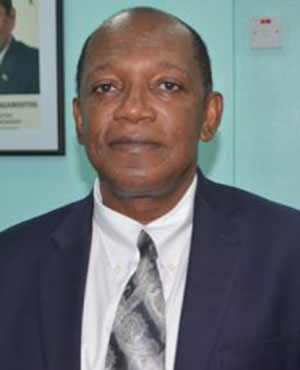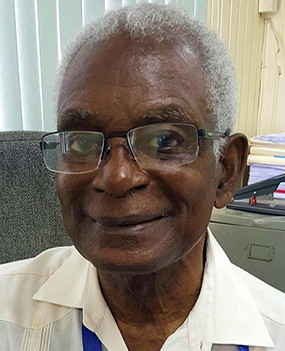-Clive Thomas says was unaware of oil block application

Eric Phillips
July 19 2019
Special Assistant at the State Assets Recovery Agency (SARA), Eric Phillips on Wednesday tendered his resignation after being officially informed that his private activities amounted to a “serious conflict of interest”, which, if ignored could have adverse effects on the organisation’s work.
This disclosure was made to Stabroek News yesterday in an exclusive interview by SARA Director, Professor Clive Thomas, who used the opportunity to repeatedly state that he was unaware that Phillips was part of a company which had applied for an offshore oil block in 2016. The application was not granted.
Concerns about a conflict of interest were raised after it was made public that Phillips, who on behalf of SARA was investigating the questionable award of oil blocks licences by the former PPP/C administration shortly before the 2015 general elections, was the Director of the African Business Round-table (ABR), the company in question. ABR’s oil and gas affiliate had applied for the block.

This newspaper reached out to Thomas last week. He however indicated that he wanted to first speak with Phillips, who at the time was abroad, before he made any public pronouncements. The two met on Tuesday and have since exchanged correspondence.
In his initial letter, Thomas told Phillips he was advised and was convinced that a “serious conflict of interest” arose from his failure to inform his office, either orally or in writing about the several private activities in areas where SARA holds responsibilities and duties pertaining to investigations of unlawful conduct in regard to state assets and the recent publication of those activities in the media while he (Phillips) was out of the jurisdiction on vacation leave.
“As you are aware such conflict can have serious adverse effects on SARA’s pursuit of its mandate”, Thomas wrote in the missive, before adding that after careful consideration it was decided that his contract will be terminated on August 31st, 2019.
Thomas in that letter made it clear that Phillips during his remaining time at the agency was not authorised to make public any information pertaining to investigative efforts except through him and that his (Thomas’s) office will take control of the oil blocks investigation until further notice.
Phillips responded giving notice of his resignation, which included the required one month’s notice in keeping with his contract.
The Director has since accepted the resignation but has taken note that the one-month notice will come to an end on August 16, 2019.
Thomas told Stabroek News that based on the response sent to him, Phillips will be off the job from August 16 but he has some leave outstanding, which will have to be looked at and dealt with by the Human Resources Department.
In a public statement issued on Monday, Phillips admitted that he was a member of the African Business Roundtable (ABR), which applied for oil blocks in 2016 but said that he became inactive in December 2016 and was not appointed to SARA until May of 2017. He said in a subsequent letter to this newspaper that it was ABR Oil and Gas which had made the application for the oil block.
Perception
Phillips argued that at the time of his appointment as part of the team investigating the award, he was no longer an active member of ABR “hence the only conflict of interest is at the level of perception not in substance.” Phillips appears to believe that a conflict of interest would exist only if he had been awarded an oil block Additionally, he is the Director of several companies, such as a fishing company, a pharmaceutical company and a logistics company. He criticized reports which highlighted this fact arguing that this is not related to the application for the oil block or to the preliminary investigation into the Canje and Kaieteur blocks.
Thomas yesterday insisted that there is absolutely no doubt that there is a conflict of interest, before explaining that such a conflict is not dependent on one committing a crime but “just the appearance that you may have other interest, added interest in the organisation you are representing. That is enough to make it, so it can happen not only in government but it can happen in businesses …even in unions (and) civil society organisations …”
Clarifying Phillips’ role in the ongoing oil blocks investigation, Thomas said “he was part of the investigation team, I can categorically say and he was the most senior person.”
Thomas admitted that SARA has to accept some culpability for what has unfolded. “I haven’t done anything wrong…but he is a senior professional, this is a man who worked …in the White House (as an intern). You can’t come and tell me that you don’t know what is required. You can’t be investigating oil blocks when you applied for an oil block…I got caught blindsided with this matter.”
He said that at the very least, Phillips should have told him that he was part of a company, which had made an application. Had this been done, Thomas said, Phillips would not have been allowed to partake in an investigation surrounding such a matter.
He said he does not know if Phillips made a full disclosure to any staff at SARA but what he is certain of, is that he Thomas was told nothing. “He never said a word to me about these businesses. I was absolutely shocked,” he added.
According to Thomas, during the face-to-face meeting with Phillips on Tuesday he stressed on the seriousness of the situation and transmitted to him that one of them would have to go. He said that he indicated too that the situation could not be ignored and required action to be taken in the best interest of the agency.
Thomas did not take too many questions on the matter, as he said he didn’t want to be “sucked into” the story, which has dominated headlines within recent days.
The Integrity Commission (Amendment of Code of Conduct) Order 2017 stipulates that “a conflict of interest arises where a public official makes or participates in the making of a decision in the execution of his or her office and at the same time knows or ought to reasonably have known, that in the making of that decision, there is material beneficial opportunity either directly or indirectly to further his or her private interest or that of a member of his or her family or any other person or entity.”
It further states that a person in public life shall, in order to protect and uphold the public interest, take reasonable steps to avoid, resolve and disclose any material conflict of interest, financial or non-financial, that arises or is likely to arise, between his or her personal interest and his or her official duties; declare any conflict of interest in writing to the relevant authority as soon as possible after becoming aware of the conflict of interest; and refuse or relinquish any outside employment, shareholding or directorship which create conflict.
SARA started the oil blocks probe just over a year ago.
Thomas had disclosed during an interview in May that a “mix of several things” led to the commencement of the oil blocks awards investigation. He recounted that some individuals had called and written to the agency indicating that there should be a serious focus on this topic. Some of them, he related, had specific information and acted “more or less as whistle-blowers and that started our investigation.”
He had gone on to explain that he and his staff were in the process of collecting data and that the initial concern was with the Kaieteur and Canje blocks.
